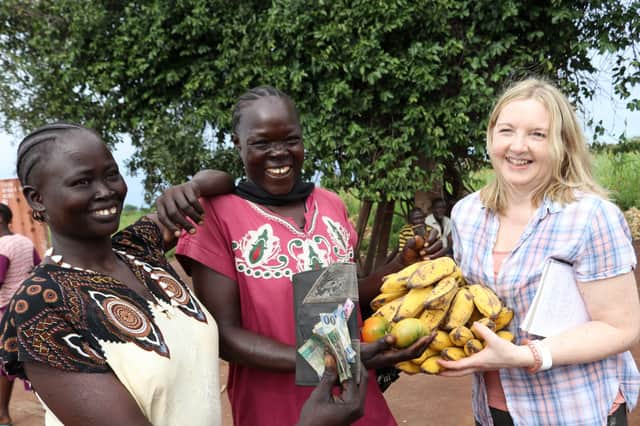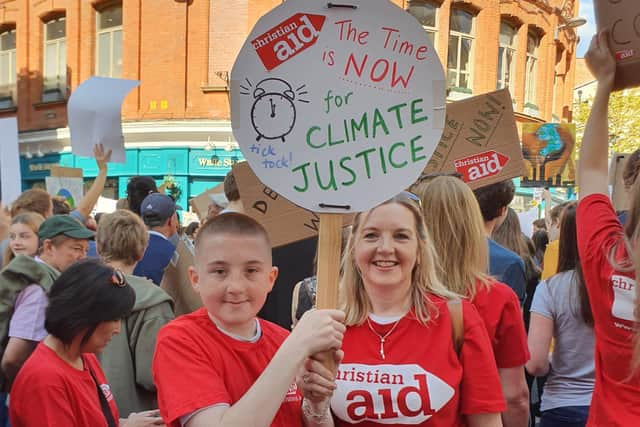Rosamond Bennett, Christian Aid Ireland: ‘Everybody has their ups and downs, but it’s a reality check for me every day at work to see how other people are living’


During her nine-year tenure as boss of the charity Christian Aid Ireland, Rosamond Bennett,53, has travelled to some of the world’s poorest and most dangerous conflict-hit regions. She has witnessed many humanitarian crises, seen terrible sights, but the place that affected her most was Gaza.
“Gaza is like the world’s biggest open air prison,” she said.
Advertisement
Hide AdAdvertisement
Hide Ad“In Northern Ireland you see an Israeli flag flying here, or a Palestinian flag flying there, but when I was actually there you meet people, ordinary men, women and children and you realise how discriminated against they are.


“I met a mother and father whose child had been bitten by a scorpion and they were held so long at the checkpoint and couldn’t get through (to access medical treatment) that she died there. I remember hearing that and thinking it was unbelievable this could happen.
“We were supporting a trauma centre there. They were working with young children who were drawing pictures of bombs dropping. Hearing about the trauma those children go through, crying at night and how disturbed they are mentally, that really shook me up,” said the mum-of-three.
“You go to certain countries and you know what to expect, but that visit to Gaza really shook me because I didn’t know what to expect. It made me think very differently about rights and injustices.”
HOSTILE ENVIRONMENTS
Advertisement
Hide AdAdvertisement
Hide AdRosamond, who is originally from Banbridge, but lives in Islandmagee, has visited many war-torn countries with the charity, including Rwanda, Iraq, Syria and Burundi. In hostile environments she doesn’t feel frightened, but admits she has
“definitely felt uneasy”.
“I can’t show fear in a place where this is people’s lives every day and this is their reality. But going to places like Gaza, South Sudan, Myanmar, they are not easy places to go to and they are not easy places for people who live there. I’ve definitely felt uncomfortable, but I try to just forget about it and immerse myself in the place when I am there.
“We go through security training and you learn how to look after yourself, but actually the biggest risk when you are in any country is road traffic accidents.”
THE PANDEMIC
Like all charities, Christian Aid has felt the impact of the Covid-19 pandemic in terms of its team, its fundraising capabilities and its overseas work.
Advertisement
Hide AdAdvertisement
Hide Ad“I was Sierra Leone in February just before lockdown happened and saw the impact of Ebola there. At that point we had heard about Covid, but it was something in Wuhan, China. Then I came home and we found ourselves in a Covid situation. It’s a terrible thing that’s affecting everybody, but we are in such a better place compared to countries like Sierra Leone and what they had to go through because their health system is so precarious. Ebola placed huge difficulties on it and then I thought they are going to go through this again because of Covid.
“I think Covid really highlighted the inequalities that exist in the world. There were furlough schemes in the UK and we had access to the health service, we had ICUs and ventilators and just none of that exists in the countries we work in. That was really challenging for all of us, especially when you know people and know the situations that they are in.”
SOUTH SUDAN
Rosamond has been travelling to South Sudan, the world’s youngest state, each year for the last three years. A place marked by intractable conflict, endemic violent crime, it is now a country teetering on the brink of famine.
“The people were already facing food insecurity, they were already suffering and at the minute they have got the worst flooding in 60 years, they are a step away from famine. And now they’ve got Covid. But they just do not have the facilities to deal with any of the healthcare issues they have. Whenever there’s flooding, whenever there’s Covid, there’s no way they can bring food in, there’s no way they can survive. It’s just tragedy upon tragedy.
Advertisement
Hide AdAdvertisement
Hide Ad“When I met them first they were eating one meal a day, they were foraging for leaves. Before Covid I could see them really progressing, there was more peace and stability and they had undergone training in terms of knowing what crops to grow for the right conditions because of climate change, but now they have been set right back.
“Everybody has their ups and downs, but it’s a reality check for me every day at work to see how other people are living. I have to ground myself and say to myself, look how much you have compared to those people you know and work with.”
LOOKING AFTER THE TEAM AND CHARITY’S SUPPORTERS
Back at home, Rosamond said her first and immediate concern during the pandemic was “the people we work with, people who we are here to support overseas and the people who support us.”
“We had people who joined us on the day we went into lockdown, who weren’t allowed to meet us and had to work remotely. I trust my team implicitly, they are really hard working, but I said to them you’ve got to look after your own health and wellbeing. You can’t work an eight-hour day at home and look after your children and maybe your elderly parents, so those first few months were really difficult in terms of trying to make sure everybody was OK and had what they needed to work from home.
Advertisement
Hide AdAdvertisement
Hide Ad“We did have a number of deaths in Christian Aid of our staff members throughout the world, in London and Colombia and Africa. That was really difficult.”
Rosamond added: “We have an older supporter base, so I was really concerned for their physical and mental wellbeing because we are really close to our supporters. I speak in churches, I meet them at events, so we were making phone calls and checking people were OK and I did a video nearly every week, just a prayer or a reading that would go out to them.
“Our older supporters were among the first group of people here to get their vaccines, so we worked with them on a vaccine justice campaign, because even now less than three per cent of people in lower income countries are vaccinated. They are not going to be vaccinated until 2024/25/26, if at all.”
Christian Aid Ireland works in 22 countries around the world. It’s focus is on humanitarian assistance, peace-building work, gender equality and women’s empowerment, and human rights.
Advertisement
Hide AdAdvertisement
Hide AdRosamond said: “During the pandemic we didn’t bring in as much money as we had hoped to bring in that year. Christian Aid Week, our biggest fundraising event of the year was in May, so we just tried to do what we could do. Our supporters were absolutely brilliant. They went out of their way to help raise funds for us and were really creative.”
*If you would like to support Christian Aid Ireland visit https://www.christianaid.ie/
A message from the Editor:
Thank you for reading this story on our website. While I have your attention, I also have an important request to make of you.
With the coronavirus lockdown having a major impact on many of our advertisers - and consequently the revenue we receive - we are more reliant than ever on you taking out a digital subscription.
Advertisement
Hide AdAdvertisement
Hide AdSubscribe to newsletter.co.uk and enjoy unlimited access to the best Northern Ireland and UK news and information online and on our app. With a digital subscription, you can read more than 5 articles, see fewer ads, enjoy faster load times, and get access to exclusive newsletters and content. Visit https://www.newsletter.co.uk/subscriptions now to sign up.
Our journalism costs money and we rely on advertising, print and digital revenues to help to support them. By supporting us, we are able to support you in providing trusted, fact-checked content for this website.
Ben Lowry
Editor
Comment Guidelines
National World encourages reader discussion on our stories. User feedback, insights and back-and-forth exchanges add a rich layer of context to reporting. Please review our Community Guidelines before commenting.